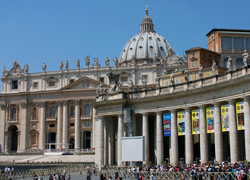Last week, the Center for Constitutional Rights (CCR) along with the Survivors Network of those Abused by Priests filed a complaint urging the International Criminal Court (ICC) to investigate their allegation that the three top Vatican officials committed crimes against humanity in covering up rape and sexual assault committed by priests around the world.

There is precedent for criminal trials of clergy for the commission of mass atrocities. The Rwanda Tribunal convicted Emmanuel Rukundo, a Catholic Priest, for committing crimes against humanity and sentenced him to 25 years. A Belgian court convicted two nuns, Sister Gertrude Mukangango and Sister Maria Kisito for their role in the slaughter of 7000 Tutsi civilians in Rwanda. Interned Jews at Auschwitz put God himself on trial, captured brilliantly in the aptly-named play God on Trial. A PBS production of the play can be found on Youtube, and the ten minute closing argument is a must see: http://www.youtube.com/watch?v=eD5HslPrBKc.
Despite the precedent, prosecuting the Pope is a legal non-starter for a host of reasons. First, at the ICC a crime against humanity requires that there is a widespread or systematic attack against a civilian population. While a cover-up is deplorable, it does not rise to the level of an attack in the crime against humanity context. Second, the Rome Statute has abettor liability, but only when the abetting conduct is done for the purpose of facilitating the commission of the principal crime. Here, the abetting was not done with the purpose of facilitating the commission of sexual abuse, but for other reasons such as salvaging its reputation. Third, the ICC only has jurisdiction for crimes committed after July 2002. This precludes much of the Catholic church’s offending behavior from the ICC’s jurisdiction. Fourth, the ICC only has jurisdiction for crimes committed in the territory of signatory countries or perpetrated by nationals from signatory countries. Neither the Vatican nor the United States are signatories for starters. Fifth, the prosecution has two procedural “outs”. They can decline to investigate a matter if they deem it not of sufficient gravity or not in the interests of justice. The ICC, still in its infancy, would avail itself of one of these options rather than take on such a big fish at this early stage. Sixth, the Security Council has the procedural right to suspend an investigation at the ICC for one year which can be renewed.
Even if the ICC could justify legally an investigation, it would be foolish to take on the Catholic Church at this stage and expend so much credibility on such a marginal case. There are much stronger cases against religious organizations/governments, such as al Shabaab in Somalia or the Taliban in Afghanistan that demand their attention.


